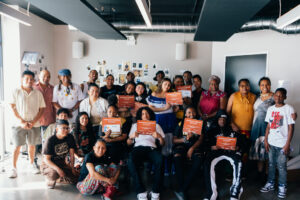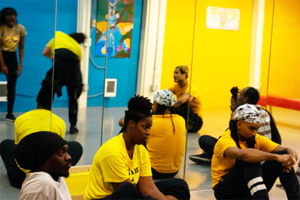What did we question in these conversations? What did we dismantle? From where do we stand to begin repairs?
We want to begin this summer newsletter by sharing the closing reflections from the eighth series of MÁS Conversaciones para MÁS orgullo, in which we explored the multiple dimensions of migration through an Afro-centered, intersectional, and trans-centered lens. Over the course of three encounters with Ana María Belique, Carla García, and Johan Mijail, we dismantled hegemonic narratives about borders, not only the physical and geopolitical ones, but also the internal, symbolic, and emotional ones that mark and violate Black, migrant, and dissident bodies from the Global South.
We spoke about borders imposed by ongoing colonial policies, but also those erected by structural racism, transphobia, and whiteness as a normative system. We denounced how these borders function as control mechanisms that surveil, silence, and criminalize the very existence of Afro-diasporic people, especially Haitians, even before crossing a territorial line
We reflected on migration as a vital and embodied process, particularly for trans, non-binary, and racialized people whose displacements are marked by constant violence. We named obstetric violence and specific cases such as that of Lourdia Jean Perrier, which reveal the systematic dehumanization faced by Black women in contexts of persecution and poverty.
This series proposed an ethic of collective care, in which recognition alone is not enough unless it leads to the active dismantling of privilege and the building of insurgent memory. We asked ourselves How did we learn to hate ourselves in transit? How do we heal the wounds inflicted by internalized racism? And we answered from a place of urgency, to build loving, affective, and spiritual responses that sustain life, resistance, and dignity.
Because racism does not define us, but it does pursue us. Because current legislation does not recognize the diversity of real citizenships. This is why we raise a cry we want to make viral: “We have the right to inhabit life free of racism, free of transphobia, where fear does not silence us.” As Audre Lorde said: Silence will not protect us.
Key reflections from the series highlight:
- The existence of multiple, physical and political borders that erect prejudice against Black, trans, non-binary, and racialized bodies, mechanisms that surveil, silence, and discard lives.
- Structural racism, particularly anti-Haitian, casts mobility as a risk even before crossing a physical border.
- Transiting bodies as vital terrain: for trans and non-binary migrants, movement is existence; it is political, embodied, and affirming. Transit is not just geographical, it is bodily and existential.
- Daily violence: from constant surveillance, the fear that robs rest, to obstetric violence against Black birthing people, like in the case of Lourdia Jean Perrier, a symbol of the global persecution of Black women, and in this case, of Haitian women in the Dominican Republic
- A chain of dehumanization that begins at the origin of life and crosses territories, bodies, and subjectivities, revealing that recognition or empathy alone is not enough,we must dismantle privilege, build collective memory, and organize for justice.
- Whiteness as an epistemic axis: it structures patriarchal, cisheteronormative, and racist discourses that validate borders and exclude those who do not conform, especially the Black, the poor, and the racialized.
- Exclusionary legislation that denies full citizenship and fails to protect diversity.
- Internalized racism (endoracismo): call us to embrace our identities and combat the discourses that divide us.
In response, we propose an ethic of affective and spiritual care, recognizing in collective spirituality the possibility of building worlds where our lives are not defined or persecuted by racism. The invitation is to create spaces of self-preservation and community resistance: We have the right to inhabit life without racism, without transphobia, where fear does not silence us.
Embracing all these reflections, today we declare our total opposition to the terror campaign promoted by the Trump administration against migrants in the United States.
We say NO to the criminalization of migrant communities, especially Black and Indigenous. The alarming increase in deportations, which fracture families and leave children abandoned in the system, along with the restriction of mobility for non-citizen residents, not only harms migrant communities, it erodes the social fabric and weakens national economic stability.
Being a racialized migrant already means facing xenophobia, racial discrimination, the pressure to culturally assimilate, and exclusionary immigration policies. Now, this landscape is compounded by systematic psychoterror: the militarization of migration controls, mass raids, and a constant, deliberately orchestrated threat designed to instill fear and control denied bodies
Migrant populations are subjected to high levels of anxiety, depression, and traumatic stress caused both by their own vulnerability and by the pain of families witnessing the departure of their loved ones, and by communities forced to relive this violence daily. We know these policies are not incidental: they are part of a deliberate strategy used as a media spectacle, as we saw in Los Angeles, where the deployment of thousands of troops and marines has been described as a tactic of provocation and destabilization.
We invite you to reflect with us on the implications of what we are living through, reflect on who gets to decide who belongs to a place and who does not. Borders crossed us long ago, and now force us to live in constant motion, fighting for the right to live with dignity. This is a call for a loving and compassionate lens, for repair, for refusing silence—for returning dignity, safety, protection, and access to a dignified life to all our communities.
















